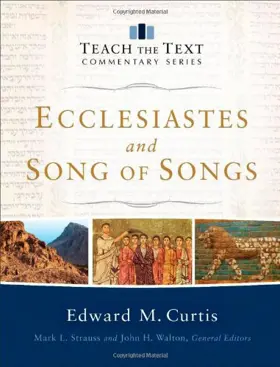

Ecclesiastes and Song of Solomon
in Teach the Text Commentary Series
Pages
192
Publisher
Baker Books
Published
9/1/2013
ISBN-13
9780801092237
How do we find meaning in life when it seems futile and meaningless? Ecclesiastes takes readers on a journey pondering this timeless question, and this commentary helps set the book within a biblical worldview in order to help teachers communicate and apply the profound truths of Ecclesiastes today.
Song of Songs is full of evocative poetry, but centuries of interpretation have produced little consensus about how this unique book should be understood. Edward M. Curtis lays out the key themes of the book and provides carefully organized commentary for interpreting, teaching, and illustrating this book
Reviews
Do you ever wonder how to make sense of the Song of Solomon? Does Ecclesiastes seem disconnected and strange?
Then this is for you.
With the knowledge and wisdom to find the deeper theological application in often complex passages, and the honesty and humility to avoid hard declarations if they cannot be backed by Scripture, Edward Curtis accomplished everything I was looking for in a commentary on these often confusing books. God included these two for a reason, and while some scratch their heads as to why, or add fanciful allegory or left field interpretation to explain them away, this book helps to unite readers with the power and clarity of God's Word, and God's Word alone.
His approach is more conservative and grounded in the text than many have been historically, though perhaps not to the extent of my own belief. Examples of that include his being unsure if Solomon actually wrote either. Thankfully, he seems to lean towards the king's direct involvement with the Song.
Curtis sees the Song as a narrative of the ideal relationship of two lovers (not three characters, as some suggest) and allows the poetic elements to justify some flexibility and blending of chronology and details, just as romantic poetry often places feelings and emotions above a cold, logical order or arrangement. He also avoids the somewhat common allegorical interpretations such as the lover representing God/Israel or Christ/The Church, instead opting to see it as a story of the God-given love between a man and woman. He often refers to Elizabeth Browning's "Sonnets from the Portuguese" to show the power of poetry to express the feelings and themes of love. While those repeated examples are certainly potent, literature is so very rife with so very many more examples of love poetry that the constant referring to a single author seemed a bit unnecessary and, admittingly, lazy.
Ecclesiastes, being another complex, though far less enigmatic, book, is made more readable and comprehensible by Mr. Curtis. Sadly, he waves off the idea of Solomon's authorship on weak evidence. Pausing at times to offer "Additional Insights" help shed light on the concepts involved, ("Teaching the Tensions of Life," and "The Dignity of Humans" and "A Poem about Death" are just a few.) and as always, the illustrations and applications are invaluable to the teacher/preacher.
However, the strength and shining glory of this series shines even brighter with this installment. The "Big Ideas" illustrations, and applications were all aimed directly at the Pastor's needs. Boiling passage units down to their main point and providing adequate commentary to explain that point is what this series does best. This not only aids the preacher in his own preaching and also focuses the commentary from becoming bogged down or off-track.
While, like any commentary, you won't agree with everything, and certainly not with these two Biblical books, the insights and study found here are sure to aid and inspire you. Showing others why these books have been written, and revealing God's plan and purpose behind them has never been easier.
Notable Quotables:
Big Idea of Ecclesiastes 3:16-4:3: "Tension between the harsh realities of life and the claims of faith highlights humanity's limited ability to answer life's ultimate questions and understand God's order."
Big Idea of Song of Songs 6:4-7:13: "Regular and repetitive praise contributes significantly to the delights of love."
Additional Insights, Page 155: "Since most marriages in Israel did not begin with love and romantic passion but were arranged, it may well be that what the Song shows us is particularly significant in moving a relationship-however it began or wherever it presently is-toward the goal that reflects God's purpose in the one-flesh relationship. This picture stands in strong contrast with the dysfunctional, manipulative, and abusive relationships that history reveals and that popular culture sets before us as normative."
[Full Review]
